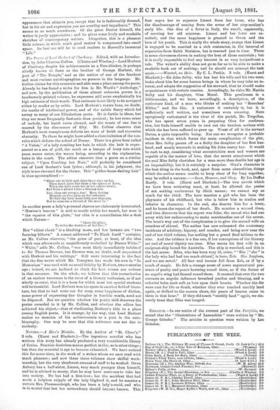The Poems of Lord Herbei t of Cherbury. Edited, with
an Introduc- tion, by John Charton Collins. (Chatto and Windas.)—Lord Herbert of Cherbury, despite his achievements as a Free-thinker, is perhaps chiefly known to fame as the brother of George Herbert, the poet of "The Temple," and as the author of one of the frankest and most curious autobiographies we possess in the language. Mr. Collins claims for this eccentric and able man a place among the poets. Already he has found a niche for him in Mr. Ward's "Anthology," and now, by the publication of these almost unknown poems in a handsomely-printed volume, he expresses still more emphatically his high estimate of their worth. That estimate is not likely to be accepted either by reader or by critic. Lord Herbert's verses bear, no doubt, the marks of intellectual power, and of the subtle fancy which led astray so many of our Elizabethan poets. He is fertile in ideas, but they are more frequently fantastic than poetical ; he has some sense of melody, but harsh notes abound, and the music of one line is marred by the dissonance of fifty. Mr. Collins observes that Herbert's most conspicuous defects are want of finish and excessive obscurity. To these he might have added a close imitation of the con- ceits which deform the school of Donne. There is a piece here called "A Vision," of a lady combing her hair, in which the hair is repre- sented as a Bea of gold, the comb as a barque of ivory into which some ,waves enter, the waves being, according to the explanation, hairs in the comb. The editor observes that a poem on a similar subject, "Upon Combing her Hair," will probably be considered one of Lord Herbert's best lyrics ; although, in his judgment, the style is too elevated for the theme. This "golden-beam-darting hair" is thus apostrophised :—
" Shoot out in light and shine those rays on far, Thou much more fair than is the Queen of Love, When she doth comb her in her sphere above, And from a planet turns a blazing star.
Nay, thou art greater, too ! More destiny Depends on thee than on her influence.
No hair thy fatal hand cloth now dispense, But to someone a thread of life must be."
In another poem a lady's personal charms are elaborately inventoried. "Heaven's heaven" is said to reside within her mouth, her nose is "the equator of this globe," her chin is a constellation like a desk which Nature-
" there did place, To write the wonders of her face."
Her "either cheek" is a blushing morn, and her breasts are "two foaming billows." A sonnet addressed "To Black Itself" contains, as Mr. Collins observes, "the germ of part, at least, of the idea which was afterwards so magnificently embodied by Blanco White." "White," adds Mr. Collins, "was most likely immediately indebted to Sir Thomas Browne, but Browne was, no doubt, well acquainted with Herbert and his writings." Still more interesting is the fact that the fine metre which Mr. Tennyson has made his own in "lu Memoriam" was used with no small felicity by Herbert, two centuries ago ; indeed, we are inclined to think his best verses are written in that measure. On the whole, we believe that this resuscitation of an ancient verseman is the error of a literary enthusiast, or if not wholly an error, that it is a boon for which none but special students will be thankful. Lord Herbert won his spars in another field of litera- ture, but that he had some ear for song, some happiness of diction, some power of expressing fine thoughts in forcible words, need not be disputed. But we question whether his poetic skill deserves the praise awarded to it by Mr. Collins, and whether the editor has achieved his object,—that of vindicating Herbert's title to a place among English poets. It is strange, by the way, that Lord Herbert makes no mention of his achievements as a poet in the auto- biography. One may be sure that this reticence was not due to modesty.






























 Previous page
Previous page